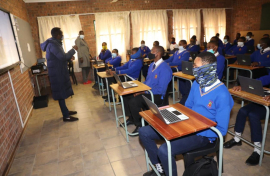
Basic Education Minister Angie Motshekga says the quality of education can only be achieved if learners and teachers are safe and healthy and if schools are free of violence, abuse and harm.
The Minster reflected on President Ramaphosa’s call during the Basic Education Lekgotla for the sector to institutionalise Care and Support for Teaching and Learning (CSTL) as a tool to improve learner outcomes.
The Minister was speaking during a Parliamentary Debate of President Cyril Ramaphosa’s State of the Nation Address (SONA) on Wednesday.
Addressing the social ills in schools, such as bullying, gender-based violence (GBV), child pregnancy, alcohol, and drug peddling, Minister Motshekga said that the National School Safety Framework remains as a strategic response.
“Our schools must be safe, weapons-free, substance-free spaces for learners and teachers, where corporal punishment, sexual abuse, gender-based violence, homophobia, racism, substance abuse and bullying are not tolerated.
“The National School Safety Framework remains our strategic response to violence, bullying and abuse in schools,” she said.
The Framework calls on all stakeholders in schools – management, teachers, unions, parents, learners, and communities to work together to make schools safe and drug-free spaces, where all learners can learn and thrive.
The Minister said the department will continue to work closely with the South African Police Services and community organisations to improve safety in all schools.
She highlighted that adolescent girls and young women remain the most vulnerable cohort in our schools and in society.
Motshekga added that girls face complex and serious challenges, including HIV/AIDS, gender-based violence, rape, abuse, and early and unintended pregnancy.
“Whilst we have significantly reduced adolescent fertility rates over the last few decades, the numbers of early and unintended pregnancies amongst adolescent girls and young women, remain unacceptably high.
“The consequences of early pregnancy to society, and the lives of young women and girls, are often devastating. About a third of girls, who fall pregnant, do not return to school; and are then vulnerable to further pregnancies; they have compromised health outcomes and higher mortality rates during childbirth; and their lack of access to education, leads to the creation of poverty traps for families and communities,” the Minister said.
She emphasised that the DBE, working with other government departments and partners, will continue to work and support young women and girls in schools.
The department will also continue to strengthen the implementation of Comprehensive Sexuality Education in all schools across the country.
The Minister said it was clear that the education system cannot survive without the direct involvement of all communities of trust, not only those who are part of the Sector, but everyone.
“There is no doubt that the Basic Education system has begun to reach the desired stability; which is healthy for a large and important system as ours. The unquestionable resilience our school community has shown, against such a devastating pandemic, the persistent loadshedding, and sporadic service delivery protests, cannot go by unnoticed,” she said.
Motshekga added that the Class of 2022 has clearly demonstrated that with all requisite support and intervention programmes, they can make it.
Closing the infrastructure gap – Progress and Challenges
Minister Mothsekga said the upgrading and maintenance of school infrastructure remain a key priority.
“For this reason, we are looking at different ways of dealing with this serious challenge which amongst others, includes changing the framework for the Education Infrastructure Grant, the delivery model for different types of structures, among others.
“We will be giving a dedicated report back on infrustructure in education, because infrastructure delivery has become one of our most seriously challenging area,” she said.
The DBE, working together with its provincial counterparts, has built 315 new schools; completed water supply projects at 1 259 schools and electricity supply projects at 373 schools.
With regard to sanitation, 2 500 schools, have been supplied with age-appropriate sanitation facilities through the Sanitation Appropriate for Education (SAFE) programme.
“But despite all these activities, just to deal with overcrowding only and not maintenance, repairs, renovations required in our schools, by last December we had estimated an urgent need for additional classrooms.
“We would also agree that class size is another important determent for quality teaching and learning; and overcrowding just simply undermines this process,” the Minister said. – SAnews.gov.za


